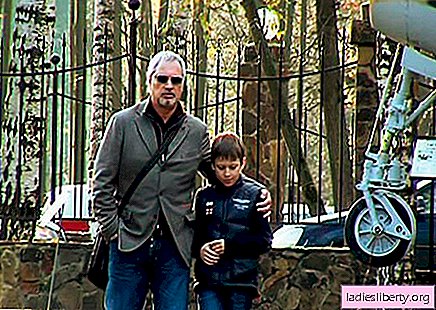
Holidays February 7
St. Mel's Day
Mel was a holy old man, a missionary, and subsequently an outstanding clergyman. It is known that his mother was the sister of St. Patrick. Mel was a good friend of Patrick, they left for Ireland together, and Mel helped Patrick there in preaching on Christian teachings. Later, St. Patrick built a church in Arda, and he chose Mel as rector. He was later appointed bishop. Saint Mel lived only by his labor. He earned his livelihood, was not ashamed of hard peasant labor. The priest shared with those in need. Saint Mel worked tirelessly in the field. According to legend, Mel created a real miracle, took live fish from peasant land. Witnessing this was his uncle St. Patrick. Seeing this, he was finally convinced that his nephew was a very religious person. Another miracle happened: Aunt Mela carried hot coals in her bare hands and received absolutely no damage. St. Mel became famous for the fact that when he took the monastic vow of Brigida, he accidentally made her bishop. The priests were perplexed, but Mel firmly stated that if this happened, then this is the will of God. Thus, Brigide was left bishop.
Holiday of the Nineteenth Day of the Month Mulk
According to the Gregorian calendar, the month of February begins the Mulk month, translated from Arabic means "Dominance". It is on this day that the holiday of the nineteenth day of the month Mulk is celebrated. In the Baha'i community, the holidays of the nineteenth Day, although they have an exact procedure, nevertheless open up vast opportunities for creativity. The holiday has three parts: prayer, administrative and social; beautiful music sounds during any of them. Believers speak eloquent stories that elevate the soul. Expressing hospitality in an original and diverse way, it is also very important at what level the general council is held and how broadly the topics are presented on the council. It is welcomed when they use elements of local cultural and historical traditions, when they spend every part of the holiday, this gives it a certain originality and clearly reflects the uniqueness of each society in which the holiday is held, and creates an atmosphere of high spirits among all those gathered.
Day of St. Gregory the Theologian
Gregory the Theologian, who served as archbishop of Constantinople, was given such a name because he studied and interpreted the Holy Scripture with great success. Gregory was given excellent home education. The Bishop of Iconium himself constantly conducted homework with the youths, he taught them the Word of God in an accessible manner, and taught oratory. Gregory always studied in the best schools. And everywhere, the guy stood out with his sharp mind and extraordinary abilities, as well as a strong faith in God. After training, Gregory went to Athens. It was there that he graduated. Gregory persistently studied geometry, l, philosophy, music, astronomy, literature and other sciences. In Athens, he met St. Basil the Great, they became very friends. When Gregory finished his studies, he worked in Athens as a teacher of eloquence. When the guy turned 30, he returned to his parents in Nazianz. Father George held a baptismal ceremony with him. When his parents died, he left his native home, and entered the service of the church of St. Thecla. There Gregory surrounded with care sick people, provided moral support to the elderly, sought material means to support the monastery. Gregory tirelessly preached the Christian faith, tried to explain the essence of Orthodox teaching. Little by little, more and more believers began to listen to the speeches of St. Gregory. St. Gregory perfectly knew the Holy Scripture. Gregory was undemanding to food, he ate mainly bread, vegetables and water, wore the saint in simple, poor clothes, and slept on a hard bed. St. Gregory struggled with heretics all his life; he demonstrated true faith by his example. When the time came for George to give his soul to God, he died in 389, and left after his life many messages, beautiful spiritual poems and sermons.
February 7 on the folk calendar
Grigoryev day, Gregory-spring indicator
On February 7, they honored the memory of Gregory the Theologian, he was one of the Church Fathers, a close friend and associate of Basil the Great. As a legacy from himself, he left 246 messages, 508 poems and 46 "words". According to the national calendar, the day before was marked as a “half-winter,” or the middle of winter, and on Grigoryev’s day, time turned to spring. The peasants said: "Aksinya Gregory hurries, so that he does not miss the spring, he has set the sun on the roofs." On February 7, the popular calendar is one of the most interesting days from the perspective of the weather forecast. It is believed that on this day you can predict the weather not only one month in advance, but even for the whole season or even more. People have noticed what the weather will be like before noon, such weather will be the first half of next winter. And the time from lunch to evening predicted what the weather would be like in the second half of winter. The peasants also noticed when it snows on Gregory, which means that winter will not come soon next year. But if the birds sang that day, the peasants were not very happy - this meant that there would still be severe frosts this month. In Russia, in the villages in Grigoryev day, it was necessary to do good deeds ourselves, and it was customary to recall the glorious deeds that other people did. However, one should be silent about one's righteous deeds: one must do good not for the sake of showing off, but for the good of one's own soul. On this occasion they said: "God already sees all good deeds."
Historical events of February 7
February 7, 1238 battle of Russian squads with the Mongol-Tatar hordes on the Kalka river
In 1223, February 7, the Russian army first encountered the Mongol-Tatar hordes. It happened on the Kalka River, in the Azov steppes. The first raid of the Mongol-Tatar army into the western lands was most likely reconnaissance, the Mongols wanted to understand what kind of enemy they would be dealing with. In addition, the Mongols had well-established intelligence, before going to any country with an aggressive campaign, the Mongols collected all the information about the future enemy. What picture appeared before the conquerors on the eve of the invasion of Russia? Feudal fragmentation prevailed on Russian lands; there was no centralized power and no regular army. Each specific prince imagined himself the most powerful and dreamed of subjugating other specific princes to himself. The situation of political fragmentation and the lack of a regular strong army, seduced the Mongol on a campaign in the Russian lands, because this was an easy profit. Having defeated the Russian squads on Kalka, the Tatars invaded Chernihiv lands, and reached Novgorod-Seversky, but did not move further, although they were tens of kilometers from Kiev, because the campaign was reconnaissance in nature. In 1235, the Mongols came to Russia with a huge army and ravaged the Principality of Ryazan, Prince Vladimir Yury, troops were sent to support the land of Ryazan, not only did they not come to the rescue, but also, when approaching Ryazan, they were defeated by the Mongol hordes. Then the Mongols completely ravaged the Principality of Vladimir and on January 20 captured Moscow. Later, the city of Vladimir fell, burned to the ground by the Mongols. The Mongols were brutal conquerors; they killed all soldiers, women, children, and the elderly. In the same Mongol campaign, the Tatars destroyed another twelve Russian cities. And two years later, under the blows of the troops of Batu Khan, Kiev fell. For almost 250 years, the Mongol-Tatars dominated Russia, all the Russian principalities paid exorbitant tribute to the Tatar khans. And only in 1480, the Grand Duke of Moscow Ivan III finally defeated the Mongol-Tatar hordes, and put an end to the Tatar yoke on the lands of Russia.
February 7, 1568 discovery of the Solomon Islands
The Spanish traveler and navigator Alvaro de Neira, went on two schooners from Peru west to the Pacific Ocean, where, after a three-month voyage, he unexpectedly stumbled upon a series of mountainous islands covered with tropical vegetation. As it turned out, dark-skinned natives lived on the islands. De Neira named the Solomon Islands, guided by biblical legends. In 1574, Alvaro was awarded the title of Marquis by the King of Spain. In addition, the monarch demanded to organize a new sea voyage, because the Spanish crown needed gold more than ever, and the Spaniards hoped to find it in distant lands. But he managed to organize the expedition only in 1595, Alvaro managed to gain a foothold on two islands, but there he soon died of a fever. Left without a leader and unable to withstand tropical diseases and the constant raids of skilled tribes, the Spaniards were forced to leave the islands. Ten years later, the Spaniards again tried to establish a colony in the Solomon Islands and made attempts to find precious stones and metals, but they did not find either one or the other. The third expedition was also destroyed by tropical diseases and local tribes. After that, the Spaniards decided not to risk it and no longer organized expeditions to the Solomon Islands. Only in 1767 the British re-discovered them, but they also suffered one defeat after another, but for a long time could not gain a foothold on the islands. In 1893, Britain transferred a powerful military contingent to the islands and were able to establish a protectorate over the islands by force of arms. In 1978, the Solomon Islands got rid of English enslavement and gained independence.
February 7, 1795 Hadzhibey port was renamed to Odessa
In the 1760s, the Turks founded a fortress in the village of Hadzhibey. During the Russo-Turkish war, the Russian army captured the fortress in 1789. The fortress was captured by the talented General Osip Deribas. After the war, at the behest of Empress Catherine the Great, powerful fortifications began to be built on the site of the Khadzhibey fortress, and the future city began to develop during this period. In 1794, the highest order approved the projects of the port and the future city. The population of the city grew rapidly, the development of industry and agriculture began. On February 7, 1795, at the highest command of the Empress Catherine the Great, the city of Hadzhibey was renamed Odessa. Over time, Odessa in its economic and cultural significance was second only to St. Petersburg, Moscow and Kiev. In 1900, the inhabitants of Odessa erected a monument to the founders of the city: Empress Catherine the Great, His Grace Prince Potemkin, Plato Zubov and Deribas. After the revolution, the monument to the founders of Odessa was dismantled and placed in the cellars of one of the Odessa museums. In 2007, justice triumphed, the monument to the founders of the city returned to its rightful historical place. The monument was restored and appeared before the inhabitants of Odessa in a more magnificent form, on the main pedestal, at the very top, stands the monumental figure of Empress Catherine the Great, because without her initiative and insight, Odessa as a city would not exist at all. It was the Great Empress who gave rise to the founding of the city, it was she who wrested their fortress from the Turks and turned the deserted sea coast into a beautiful city. Glory and memory to Empress Ekaterina Alekseevna.
February 7, 1863 first fire extinguisher patented in the USA
Nowadays, a fire extinguisher has become a familiar means of extinguishing a fire. This device can be seen everywhere: in transport, in schools, kindergartens, in state and non-state institutions. After all, the presence of a fire extinguisher in the modern world is a mandatory rule of fire safety. The first officially patented fire extinguisher was the device invented by Alan Creem on February 7, 1863. A little later, the so-called "explosive" and foam fire extinguishers were invented. The principle of a powder fire extinguisher is used in our time. Currently, fire extinguishers are produced in millions of batches. Firstly, it is required by the laws of fire safety, and secondly, a fire extinguisher is a real life-saving tool in the event of a fire and it is desirable to have it also in residential premises. Mandatory is the presence of fire extinguishers, both in personal vehicles and in public. Every year, tens of millions of people suffer from fires all over the world, they lose their property, shelter, and sometimes even life. Therefore, let there be a fire extinguisher in your household, but you will never have to use it. The rules for operating a fire extinguisher should be known to everyone from a child to an elderly person.
February 7, 1998 XVIII Winter Olympic Games opened in the Japanese city of Nagano
On February 7, 1998, near the capital of Japan, at the grand stadium in Nagano, the 18th Winter Olympic Competition was inaugurated. The city of Nagano became the capital of the eighteenth Olympic Games, and it is no coincidence that the city was chosen by the IOC session in Birmingham. The UN General Assembly supported this decision, and declared the Olympic Games a symbol of international peace and harmony. The Olympics in Nagano became the record holder in the number of participants, about 3000 athletes from more than 70 countries of the world took part in the competitions. At that time, it was a record, in these games most athletes and states took part than in any previous winter Olympic games. Even athletes who traditionally did not participate in the Winter Olympic Games took part in the competitions: Brazilians, Uruguayans, Bermuda, etc. New sports were introduced into the program of the games for the first time: curling, snowboarding and women's hockey. At the games in Nagano, 68 medal sets were presented for the draw. In general, the largest number of victorious medals was won by athletes from Germany - 29 awards, the Norwegians came second - 25 victorious medals, the third was Russian representatives with 18 victorious medals. The Nagano Olympics featured a particularly vivid staging and unprecedented special effects, these games have become a real celebration for the people of the whole world.
Born on February 7
Anna Ioannovna (February 7, 1693 - October 28, 1740), Empress of All Russia
Tsarevna Anna was born on February 7, 1963 in Moscow. She was the daughter of Tsar Ivan V and was under the supervision of her uncle Peter I until the age of 17; in 1710, he married Anna to the Duke of Courland. However, Anna's husband, shortly after the wedding, died of a fever. Remaining a widow, Anna was about to return to Moscow, but Peter ordered her to stay in Courland and to be the overseer there for the affairs of the duchy. After the death of Peter I and Peter II, there were no direct male descendants in the Romanov dynasty. In such a situation, the Supreme Privy Council invited Anna to reign, but the leaders wanted to have a nominal monarch, and they wanted to rule the country themselves. The members of the Council sent Anna the so-called "Conditions", which limited her power, but the princess was warned by opponents of the restriction of the autocracy. Anna cordially greeted the ambassadors from the leaders and without hesitation signed the "Condition". However, Anna knew that the opponents of the restriction of autocracy in Russia were: the clergy and the nobility, which supported Anna in this situation. When Anna arrived in Moscow in 1730, she tore off the conditions she had signed, and was immediately proclaimed the autocratic Empress of All Russia.Having come to power, Anna liquidated the “council of supremes” and established a cabinet that is fully accountable to her. She suppressed and practically destroyed the influence on the state policy of the ancient noble families: Dolgoruky, Golitsyn, Volyn and others. The Empress established a secret chancellery, a special intelligence service reporting directly to the Empress. Basically, Empress Anna Ioannovna continued the policy of her uncle Emperor Peter I.
Thomas More (February 7, 1478 - July 6, 1535), English writer and statesman
Thomas was born on 02/07/1478, in a family of lawyers, his father was an honest and not corrupt judge. General received primary education at St. Anthony's school. At 13, he serves as a page with the Archbishop of Canterbury. The archbishop liked the boy with a cheerful character and a thirst for knowledge. Under the patronage of the Archbishop, Mor enters the University of Oxford, Law School. Not attracted to a lawyer's career, Moore was elected to the English Parliament in 1504. In parliament, Moore tried to “stretch out” a bill on tax cuts. However, the king of England, Henry VII, did not tolerate opposition in parliament and imprisoned Mohr's father, under such pressure, Thomas was forced to leave politics. Moore will be able to return to political activity only under King Henry VIII. During his reign, Thomas was highly respected by the monarch and was even knighted. A big fighter for the ideas of the Catholic Church, Thomas was sympathetic to the king, but fanatical loyalty to the Catholicos ultimately led Thomas to death. When the king first intended to get a divorce, Thomas insisted that only a special rescript of the Pope could divorce him, but he did not want to breed the king. Without hesitation, the quick-tempered Henry broke off all relations with the Pope and, in general, with the Catholic Church. In protest, Moore resigned and defiantly ignored Henry's wedding with his new wife. In addition, he refused to take the oath to the new queen, which meant that Pestilence would not recognize the new queen and her future children. Henry, short-tempered, angry, ordered the arrest of Mora and brought him to trial. Soon the court issued a guilty verdict and Mora was executed. Later, the Catholic Church canonized Mora and ranked the saints.
Oleg Antonov (February 7, 1906 - April 4, 1984), Soviet aircraft designer, academician
An outstanding Soviet aircraft designer was born on February 7, 1906 in the Moscow province. From his youth Oleg began to get involved in aviation modeling, and with his friends he organized the Aviation Fans Club. After school, Oleg worked in the community of the air fleet and created his own aircraft models. In 1930, Oleg graduated from the Leningrad Polytechnic Institute. Then he was sent to Moscow, where he organized a design bureau for the design of gliders. During the Second World War, Oleg Konstantinovich began to build landing gliders, which helped to supply the partisans with weapons and provisions. Also during this period, Antonov perfected the Yak fighter, which later became the leading fighter of the war. Nevertheless, Antonova was more interested in working on the creation of peaceful aircraft. In Novosibirsk, he creates the An-2, which three years later was introduced into mass production. The people nicknamed this plane a "corn worker", this aircraft, has gained worldwide reputation as a reliable and robust machine. In 1952, Antonov with his design bureau moved to Kiev, where a powerful aviation plant was created with the most modern equipment. Under Antonov’s leadership, unique aircraft models were created: An-8, An-12, An-22, An-26, An-32, An-72, An-124, An-14, An-28, An-10, An-10 24, An-11, An-13, An-15. In 1962, Antonov became Director General and Designer of Design Bureau. In the future, the team brought up by Oleg Konstantinovich created the world's largest military transport aircraft - "Mriya".
Alfred Adler (February 7, 1870 - May 28, 1937), Austrian psychologist and psychiatrist
Alfred Adler was born on 02/07/1870 in Vienna. As a child, he was very ill, but was able to get out. He had severe pneumonia, he was barely saved. In his youth, he almost died in a street fight. After all these misadventures, Adler decides to become a doctor and joins Freud's psychological school. In his first work on psychology, "On the inferiority of organs," Adler formulates a paradigm in which he explains that illness is a violation of harmony and balance in relations with reality. According to Adler's concept, an unbalanced organism by any means strives to compensate for the disharmony that has arisen. The principle of the body's compensatory abilities is the main foundation of the Adler school. The phenomenon of compensation was interpreted by Adler as a universal and natural tool of human mental activity. The goal and the way to achieve it were also considered by Adler in the context of ideas for compensating mental processes. Based on his research, Adler makes a conclusion about the social aspect of personality formation. Adler actively interacted with various psychological and psychiatric schools, he never clashed with new ideas and concepts, but tried to take from them something useful and necessary for his work. Adler taught a lot and was an authoritative and recognized psychologist and psychiatrist.
Alexander Chizhevsky (February 7, 1897 - December 20, 1964), famous Soviet biophysicist
Alexander Chizhevsky was born on February 7, 1897, in the Grodno province. From 1913 to 1915 he studied at the Kaluga gymnasium. During this period, the young man met with K. E. Tsiolkovsky, who had a great influence on the schoolboy and, in fact, determined his future fate as a scientist. In 1915, Alexander made a presentation in the community of natural sciences, where he describes the nature of the Kaluga region. In addition, he presents a revolutionary theory for that time about the influence of the sun on the earth's biosphere. In 1915, Alexander entered the Kaluga branch of Moscow University, the faculty of archeology. In 1918, the twenty-one-year-old Chizhevsky defended his doctoral dissertation at Moscow State University with brilliance. In his dissertation, Alexander investigated and made his real proposals in the field of world-historical natural periodicity. After such a success, and besides, having received a doctorate in sciences, Alexander entered two faculties at once: natural-mathematical and medical. Since 1924, a young scientist has been working in the laboratory of zoopsychology at Moscow State University, in his experiments he studies the effect of aeroionization on living organisms. In 1942, Chizhevsky was repressed and sent to distant Kazakhstan camps, where he stayed until 1950, and then another 8 years the scientist was in exile, in Karaganda, but there he continued to engage in science. In 1962, the scientist was found innocently injured and rehabilitated. The scientist’s great discovery is his explanation, the influence of space processes on living organisms.
Birthday on February 7
Anatoly, Boris, Dmitry, Stepan, Felix











